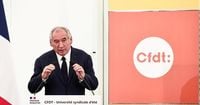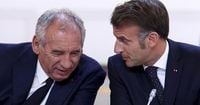France is once again standing at the edge of political and financial upheaval, as Prime Minister François Bayrou’s minority government faces a make-or-break confidence vote in the National Assembly on September 8, 2025. The outcome of this vote is widely expected to topple Bayrou’s administration, plunging the country—and possibly the wider Eurozone—into another period of instability that’s already sending shockwaves through European markets and rattling business leaders at home.
Bayrou’s gamble comes less than nine months after he was sworn in as France’s third prime minister in just over a year, following the brief and turbulent tenure of Michel Barnier. According to AP, Bayrou’s government—holding just 210 of 577 seats—faces the united opposition of both the far-left and far-right, who together control over 320 seats. The centrist coalition’s only hope lies in persuading adversaries to abstain, but opposition parties have already declared their intent to vote the government out.
The trigger for this political standoff is Bayrou’s proposed 2026 budget, a package of austerity measures designed to slash 44 billion euros (about $51 billion) from public spending. The plan, which includes the elimination of two state holidays and a freeze on pension indexations, aims to address France’s ballooning deficit—projected at 5.4% of GDP for 2025, well above the European Union’s 3% target. Last year’s deficit reached 5.8%, and the country’s total debt now stands at a staggering 3.3 trillion euros, or more than 114% of GDP, according to The New York Times.
Bayrou has framed the upcoming vote as a stark choice. In a speech to the C.F.D.T., France’s largest labor organization, he warned, “Lawmakers have 13 days to choose between chaos or responsibility.” Yet, the mood in parliament and on the streets suggests that chaos is winning out. Labor unions are fiercely opposed to the planned cuts, especially the removal of national holidays, which has sparked nationwide fury. Calls are growing on social media for a general strike on September 10, with hashtags urging citizens to “close down France” by boycotting work, schools, and shops.
The political turmoil is already taking a toll on the economy. As Bloomberg reports, company executives are delaying hiring and investment decisions, wary of how any new administration would tackle the deficit—the largest in the euro area. ING Bank analysts wrote that the instability is “becoming an economic liability” for France, which is already struggling with sluggish growth forecasts of just 0.8% this year.
Financial markets have responded with palpable anxiety. The Paris CAC 40 benchmark index dropped over 2% in recent days, with major French banks like BNP Paribas and Société Générale tumbling by more than 5%, according to AINVEST and The New York Times. Investors fear that France’s mounting debt could prompt global ratings agencies to downgrade its sovereign bonds—a move that would further raise borrowing costs and deepen the crisis.
The ripples extend far beyond France’s borders. The yield on 10-year French government bonds has risen to 3.53%, and the spread against German bunds—the Eurozone’s benchmark—has widened to 75 basis points, the highest since the 2012 Eurozone debt crisis. The broader STOXX 600 index has also declined, with capital flowing into the relative safety of Germany and Switzerland. As The Economist notes, “Markets are already nervous as France heads into yet another spell of political instability.”
The stakes are not lost on the French government. Finance Minister Eric Lombard issued a stark warning on August 26, suggesting that without urgent action, France might need assistance from the International Monetary Fund. “I cannot assure you that the risk of I.M.F. intervention does not exist,” he said in a radio interview. He later clarified via social media that France is not under immediate threat from the IMF or the European Central Bank and is still able to finance its debt “without difficulty.” Still, the warning rattled investors and underscored the gravity of the situation.
President Emmanuel Macron, meanwhile, has been largely focused on foreign affairs—whether sitting alongside President Trump to broker a European deal for Ukraine or announcing France’s recognition of a Palestinian state. Yet, the domestic crisis has become impossible to ignore. Macron has vowed to remain in office until his term ends in 2027, but if Bayrou’s government falls, he will face the daunting task of appointing a new prime minister for the third time in a year.
The options are all fraught. Macron could attempt to consolidate his centrist alliance by appointing a figure from the traditional left or right, but with parliament so deeply divided, any new prime minister would be on precarious footing. Some politicians, including far-right leader Marine Le Pen, are calling for fresh legislative elections—a high-stakes gamble that could further reshuffle the political deck ahead of the 2027 presidential race. Macron has not yet indicated whether he would take this step.
For investors and market watchers, the path forward is shrouded in uncertainty. The outcome of the September 8 vote will be pivotal. Should Bayrou’s government collapse, the European Central Bank may be forced to intervene using its Transmission Protection Instrument to stabilize markets—though this comes with its own risks of moral hazard. A successful confidence vote might narrow bond spreads and calm nerves temporarily, but the underlying issues—high debt, sluggish growth, and political fragmentation—will remain unresolved.
In the meantime, investors are adjusting their strategies. Defensive equity positions in sectors less exposed to fiscal drag, such as healthcare, utilities, and renewable energy, are gaining traction. Fixed-income investors are favoring short-duration French government bonds, paired with high-quality Eurozone corporate debt, and using credit default swaps to hedge against the risk of a French downgrade or default. Geographic diversification is also on the rise, with capital flowing to countries perceived as more fiscally sound.
History offers a sobering lesson: political instability breeds market volatility, but it also creates opportunities for those able to look beyond the immediate headlines. As Goldman Sachs noted, the situation in France “reminds investors of the vulnerability of France but also of Europe more widely, given the fragile fiscal situations of a number of economies.” With Italy’s bond yields rising in tandem and memories of the 2012 Eurozone crisis still fresh, the risk of contagion is real.
France’s fate—and perhaps the stability of the wider Eurozone—now hangs on the outcome of a single vote. The coming weeks will test the resilience of both its political institutions and its economy. For ordinary citizens, business leaders, and investors alike, all eyes will be on the National Assembly as the country decides whether to chart a new course or plunge deeper into uncertainty.




